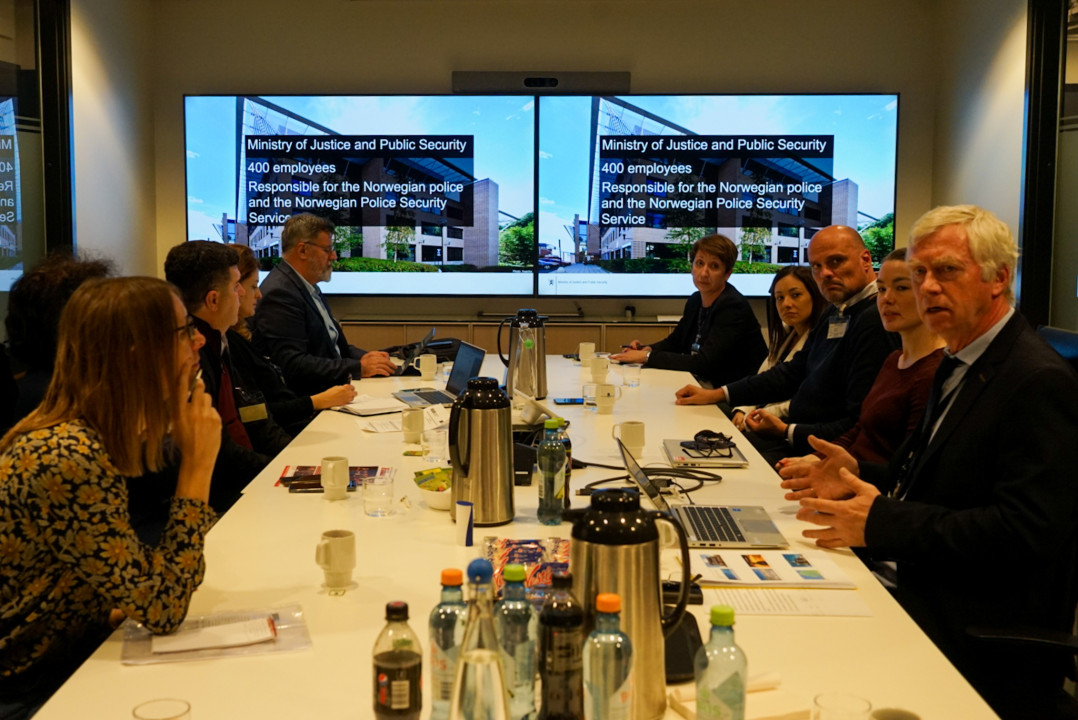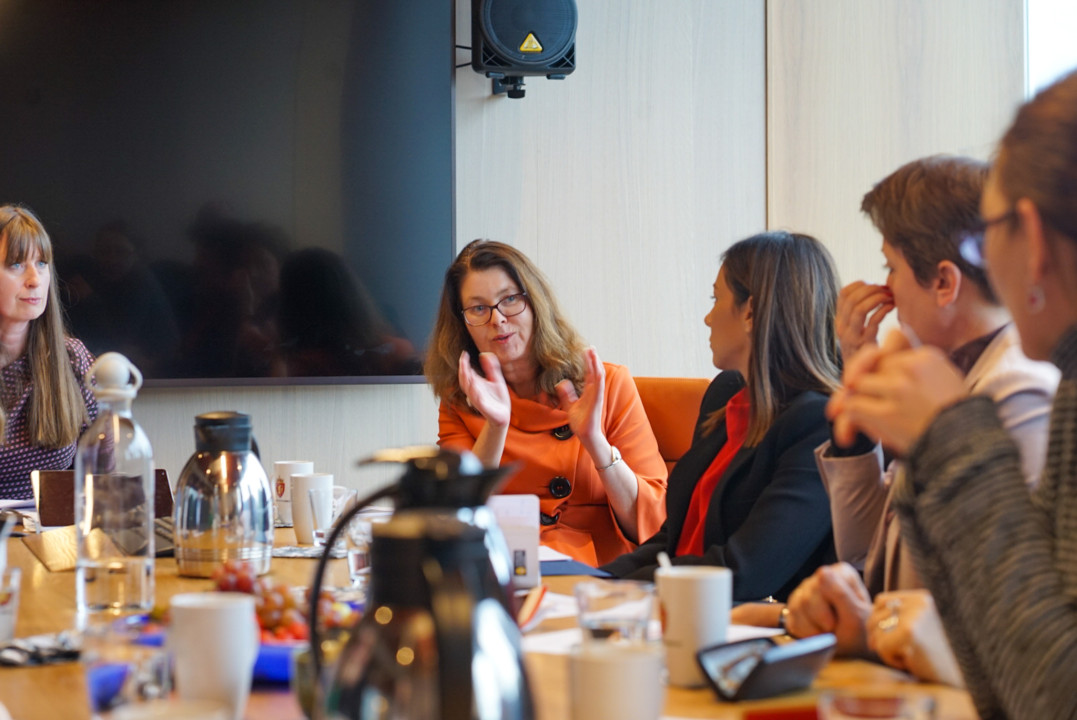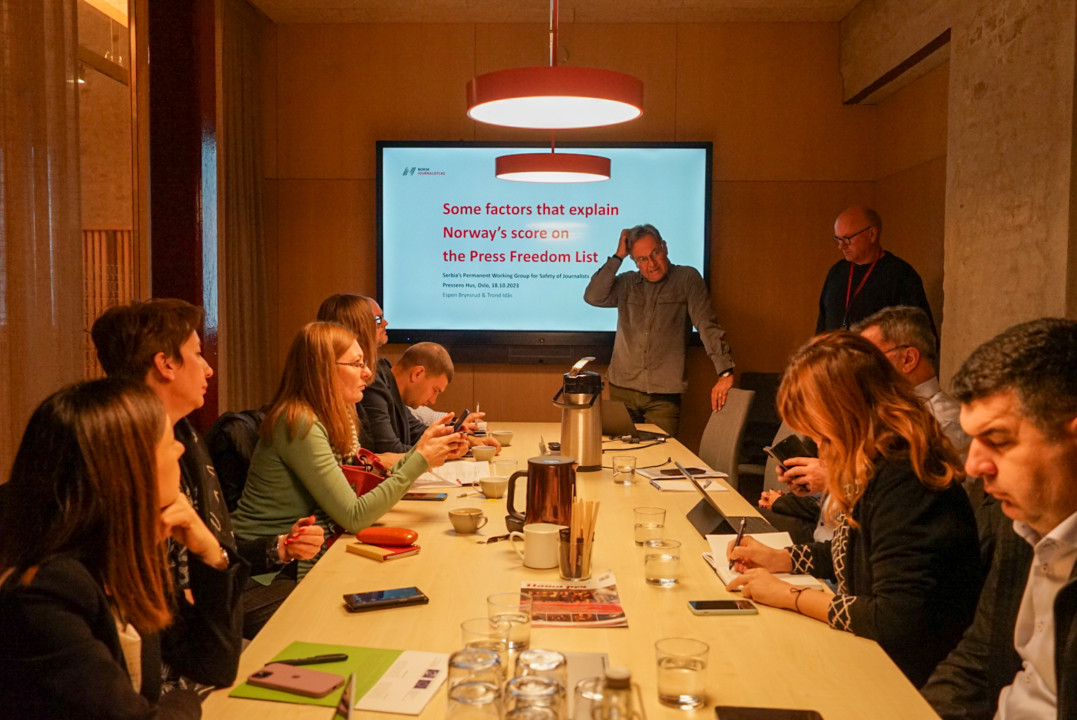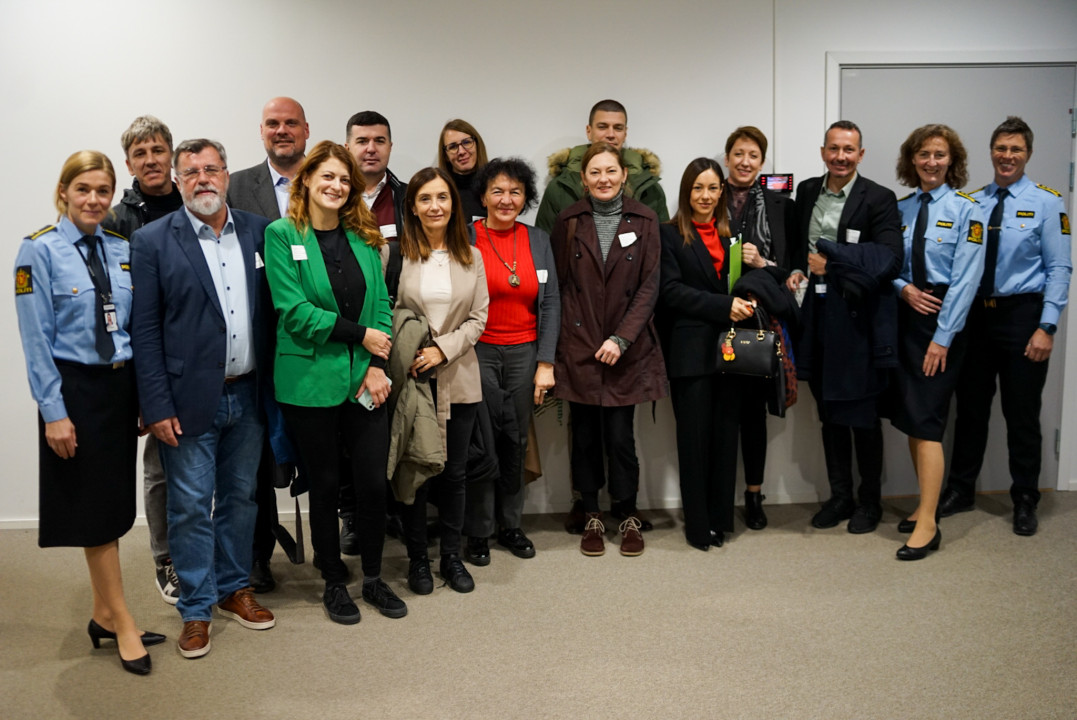*English version below*
Cilj posete bila je razmena znanja i iskustava sa norveškim partnerima o prevenciji krivičnih dela i efikasnijem procesuiranju napada i pretnji novinarima u digitalnom okruženju. Reč je o aktivnosti koja je predviđena Akcionim planom SRG za 2023. godinu.
Na sastanku u Ministarstvu pravde i javne bezbednosti predstavnicima SRG je predstavljen izveštaj Norveške komisije za slobodu izražavanja iz 2022. godine čiji rezultati su pokazali da je tek 10 odsto anketiranih novinara bilo izloženo napadima i/ili pretnjama. Ovaj procenat je više od 5 puta manji u odnosu na slično istraživanje koje je, za potrebe SRG, iste godine sprovedeno u Srbiji, a prema kome je 55 odsto anketiranih novinara potvrdilo da su bili meta nekog napada ili pritiska.
Predstavnici policije i tužilaštva su govorili o značaju preventivnih mera i saradnje pošto, po njihovom iskustvu, efikasna strategija sprečavanja krivičnih dela zahteva koordiniranu akciju i aktivan pristup svih relevantnih aktera.
Pored toga, predstavnici norveške policije su naglasili da se njihova strategija prevencije u dobroj meri zasniva na permanentnom prisustvu na svim digitalnim platformama i mrežama gde kroz komunikaciju sa građanima dobijaju informacije o krivičnim delima koja se pripremaju ili dešavaju u realnom životu, za koja inače ne bi nikada saznali.

U razgovorima o pravnom okviru zaštite bezbednosti novinara, SRG je saznala da norveški Krivični zakonik predviđa krivično delo “Mešanje u rad važnih društvenih institucija”, u koje spadaju i mediji, a kojim je predviđena kazna zatvora do 6 godina za ometanje, nasilje, pretnje i druga protivpravna ponašanja prema medijima. Pored ovog krivičnog dela, koje se vrlo retko primenjuje u praksi, norveški pravni sistem ne pruža posebnu pravnu zaštitu novinarima i drugim medijskim radnicima.
Na sastanku sa Norveškim medijskim regulatornim telom, delegacija SRG se upoznala sa strukturom, organizacijom i ovlašćenjima ovog tela kao i sa zakonskim rešenjima koji se odnose na finansiranje medija i njihovu odgovornost za poštovanje zakona i profesionalnih standarda novinarske profesije. SRG je dobila informacije i o aktivnostima Norveškog regulatornog tela u okviru Evropske platforme regulatornih tela (EPRA) koju čine 56 regulatornih tela iz 47 evropskih država.
Predstavnici Norveškog sindikata novinara, koje ima 8700 članova što predstavlja više od 90 odsto od ukupnog broja novinara u ovoj zemlji, istaklo je da je ključni razlog za bezbedan rad novinara u ovoj zemlji kvalitetna organizacija okruženja u kojem medijski profesionalci rade. Naročito su istakli odličnu saradnju sa norveškim državnim institucijama koje razumeju značaj slobodnih medija i poštuju važnu ulogu novinara i medija u demokratskim društvima. Vrhovni sud Norveške, po njihovim rečima, zauzeo je stav da nasilje nad novinarima mora da ima za posledicu strože kažnjavanje. Istakli su i da je u Norveškoj najveći problem nasilje nad norveškim novinarima koji rade van zemlje i izveštavaju iz kriznih situacija.
 Sa predstavnicima Norveškog udruženja urednika, koje ima 800 članova od čega 350 glavnih urednika i oko 450 zamenika, i Saveta za štampu, SRG je razgovarala o zaštiti novinarskih izvora i poštovanju Etičkog kodeksa. Norveški urednici su naročito naglasili značaj Sporazuma o pravima i dužnostima urednika koji su sklopili sa Udruženjem vlasnika medija po kome nijedan organ vlasti, medijski vlasnik, komercijalni akter, kao ni bilo koja druga interesna grupa, ne sme da se meša u slobodu i uređivačku politiku medija.
Sa predstavnicima Norveškog udruženja urednika, koje ima 800 članova od čega 350 glavnih urednika i oko 450 zamenika, i Saveta za štampu, SRG je razgovarala o zaštiti novinarskih izvora i poštovanju Etičkog kodeksa. Norveški urednici su naročito naglasili značaj Sporazuma o pravima i dužnostima urednika koji su sklopili sa Udruženjem vlasnika medija po kome nijedan organ vlasti, medijski vlasnik, komercijalni akter, kao ni bilo koja druga interesna grupa, ne sme da se meša u slobodu i uređivačku politiku medija.
Razmatranje mogućnosti za uspostavljanje saradnje i eventualno postizanje sličnog sporazuma u Srbiji biće jedna od potencijlanih budućih inicijativa, pored drugih vezanih za prevenciju krivičnih dela i veću bezbednost novinara u digitalnom okruženju.
Na kraju, norveški partneri su vrlo pozitivno reagovali na dosadašnji rad SRG koji im je predstavljen kroz izveštaje koji pokrivaju period od 2017 do 2022 godine. Naročito su istakli vrednost izgradnje institucije koja se bavi zaštitom bezbednosti novinara, potrebu za stalnom edukacijom pripadnika organa za sprovođenje zakona i novinara, važnost vođenja baze podataka o napadima na novinare i, za njih, iznenađujuće operativnim radom Stalne radne grupe i dobrom saradnjom novinara i institucija.
Stalnu radnu grupu za bezbednost novinara čine predstavnici Vrhovnog javnog tužilaštva, Ministarstva unutrašnjih poslova Republike Srbije, Udruženja novinara Srbije (UNS), Nezavisnog udruženja novinara Srbije (NUNS), Nezavisnog udruženja novinara Vojvodine (NDNV), Asocijacije medija (AM), Asocijacije nezavisnih elektronskih medija (ANEM) i Asocijacije onlajn medija (AOM) kao i Misije OEBS-a u Srbiji u statusu posmatrača.
Projekat studijske posete SRG Norveškoj realizovan je uz podršku Delegacije Evropske Unije u Srbiji.
The Permanent Working Group for the Safety of Journalists visits Norway with the aim of strengthening preventive mechanisms to protect the safety of journalists
In cooperation with the OSCE Mission to Serbia and the Royal Norwegian Embassy in Belgrade, the Permanent Working Group for the Safety of Journalists (PWG) visited Norway from 16 to 18 October meeting numerous institutions and organizations dealing with media freedom and the safety of media workers.
The aim of the visit was to exchange knowledge and experiences with Norwegian partners on the prevention of criminal acts and more efficient processing of attacks and threats against journalists in the digital environment. It is an activity foreseen in the PWG’s Action Plan for 2023.
At a meeting with the Ministry of Justice and Public Security, representatives of the PWG were presented with the main findings of the 2022 report of the Norwegian Commission for Freedom of Expression, which shows that only 10 percent of surveyed journalists were exposed to attacks and threats. This percentage is more than 5 times lower compared to similar survey conducted by the PWG in Serbia in the same year, according to which 55 percent of surveyed journalists confirmed that they were the target of some attack or pressure.
The representatives of the police and the prosecution spoke about the importance of preventive measures and cooperation since, in their experience, an effective strategy to prevent criminal acts requires coordinated action and an active approach of all relevant stakeholders.
In addition, representatives of the Norwegian police emphasized that their prevention strategy is largely based on their permanent presence on all digital platforms and networks where, through communication with citizens, they receive information about crimes that are being prepared or are happening in real life, which would never been discovered otherwise.
In discussions about the legal framework for the protection of journalists' safety, the PWG learned that the Norwegian’s Penalty Code prescribes the criminal offense of "Interfering with the important institutions in society", which includes the media, and which provides a penalty of imprisonment of up to 6 years for obstruction, violence, threats and other illegal behaviour towards the media. In addition to this criminal offense, which is very rarely applied in practice, the Norwegian legal system does not provide special legal protection to journalists and other media workers.
 At the meeting with the Norwegian Media Authority, the PWG delegation got acquainted with the structure, organization and competencies of this body, as well as with the legal solutions related to the financing of the media and their responsibility for compliance with the laws and professional standards of journalism. PWG was also informed about the activities of the Norwegian Media Authority within the European Platform of Regulatory Bodies (EPRA), which consists of 56 regulatory bodies from 47 European countries.
At the meeting with the Norwegian Media Authority, the PWG delegation got acquainted with the structure, organization and competencies of this body, as well as with the legal solutions related to the financing of the media and their responsibility for compliance with the laws and professional standards of journalism. PWG was also informed about the activities of the Norwegian Media Authority within the European Platform of Regulatory Bodies (EPRA), which consists of 56 regulatory bodies from 47 European countries.
Representatives of the Norwegian Union of Journalists, which has 8,700 members representing more than 90 percent of the total number of journalists in this country, pointed out that the key reason for the safe work of journalists is the quality organization of the environment in which media professionals work. In particular, they emphasized an excellent cooperation with state institutions which understand significance of media freedom and respect the important role journalists and media have in democratic societies. According to them, the Supreme Court of Norway took the stance that violence against journalists must result in more severe punishment. They also pointed out that the biggest problem in Norway is violence against Norwegian journalists working outside the country and reporting from war zones.
With representatives of the Norwegian Association of Editors, which has 800 members of which 350 are editors-in-chief and approximately 450 deputy editors, and the Press Council, PWG discussed the protection of journalistic sources and a need for compliance with the Code of Ethics. The Norwegian editors particularly emphasized the importance of the Agreement on the Rights and Duties of Editors they signed with the Association of Media Owners, according to which no state authority, media owner, commercial actor, or any other interest group, may interfere in the freedom and editorial policy of the media.
Consideration of the possibility of establishing cooperation and eventually reaching a similar agreement in Serbia will be one of the potential future initiatives, in addition to others related to the prevention of criminal acts and improvement of the safety of journalists in digital environment.
In the end, the Norwegian partners reacted very positively to the previous work of PWG, which was presented to them through its annual reports covering the period from 2017 to 2022. They particularly emphasized the value of building an institution that deals with the protection of the safety of journalists, the need for constant education of members of law enforcement authorities and journalists, the importance of keeping a database on attacks on journalists and, for them, surprisingly operational work of the PWG and the good cooperation between media community and institutions.
The Permanent Working Group for the Safety of Journalists consists of representatives of the Supreme Public Prosecutor's office, the Ministry of Internal Affairs of the Republic of Serbia, the Association of Journalists of Serbia (UNS), the Independent Association of Journalists of Serbia (NUNS), the Independent Association of Journalists of Vojvodina (NDNV), the Media Association (AM), the Association of Independent Electronic Media (ANEM), the Association of Online Media (AOM), and the OSCE Mission to Serbia in the observer’s capacity.
The PWG’s study visit to Norway was implemented within the project supported by the EU Delegation to Serbia.


